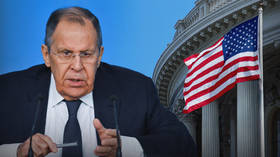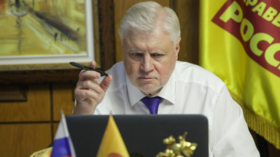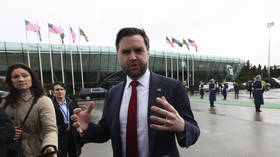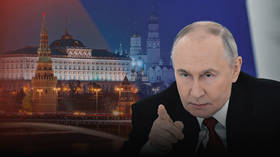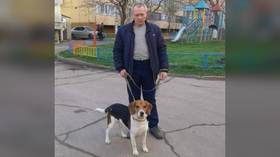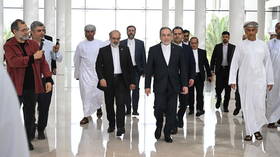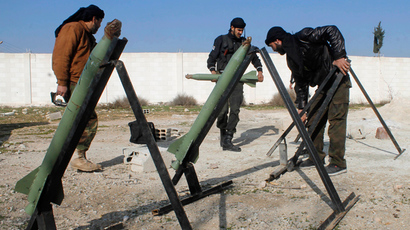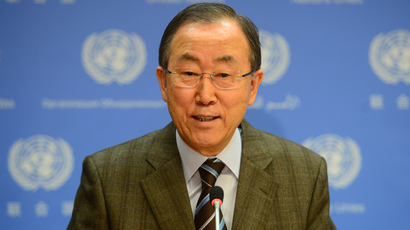Syria peace talks: 'We have taken the first small step'
UN Secretary General Ban Ki-moon said that ‘the really hard work begins on Friday’ with regard to reaching a diplomatic solution in Syria. “Nobody underestimates the difficulty of this issue,” he announced on the first day of peace talks in Switzerland.
UN mediator Lakhdar Brahimi added that it was unclear whether they would be able to successfully bring the two Syrian sides face to face in the same room on Friday, which is when the rival Syrian delegations said that they will sit down for direct talks.
“Hopefully by the afternoon we will be able to meet with both sides in one room…of course the results will not be brought about in a speedy way, this will take a great deal of time,” Brahimi said. He stated that he will be meeting with the Syrian delegations separately on Thursday, prior to the first round of negotiations.
As questions were fielded, Ban added that all parties must “respect international humanitarian law”, which he said had been “flagrantly violated in this conflict.” While state institutions must be preserved, civilians are facing desperate health conditions, he pointed out. He further stated that he has urged the Syrian government to release detainees as a confidence-building measure.
Ban added that arrangements must be made for a local ceasefire and urged for the resolution of the violent conflict in the country to be conducted through political dialogue, rather than military means.
“There is no other solution,” he said. “I have been urging all the countries - who have been providing arms to either side…[to] stop - and encourage them to engage in political dialogue.”
Some 100,000 people have been killed over the course of the conflict, and millions displaced.
The Geneva communiqué seeks to formulate plans for political transition within Syria.
However, Wednesday’s talks witnessed fraught scenes between international heavyweights, with Syrian Foreign Minister Walid Muallem telling US Secretary of State John Kerry that no one had the right to “withdraw legitimacy” from the Syrian president or government.
Kerry reiterated his stance on the Syrian government, insinuating that there will be no resolution until Assad is removed from government. “Saving Syria is impossible while Assad remains in power,” he said.
Speaking to reporters, Kerry said the purpose was to create a transitional government and that the outcome of the talks “cannot be about one man, or one family, insisting on clinging to power.” Syrian delegates responded stating that there would be no transfer of power.
Russian Foreign Minister Sergey Lavrov has urged both the Syrian opposition and its foreign backers not to concentrate their focus exclusively on a change of leadership in the country.
“As for guarantees that the talks will not collapse - it is necessary to influence both delegations so that this does not happen,” Lavrov said after talks on Wednesday. “The main thing is to start the process," he said, adding that the less-difficult issues to resolve would be ensuring humanitarian aid, prisoner swaps, and other confidence-building steps.
Bashar Jaafari, the current Syrian representative at the UN, told the international meeting that “we will hopefully engage in a process of dialogue mainly aiming at implementing the provisions of Geneva 1.”
He added that Syria needs encouragement to engage in a “sincere and honest” end to the violence, stating that the problem of terrorism also needs to be resolved. Jaafari expressed disappointment that an Iranian delegation was not present at the talks.
“So we had today 40 countries seemingly pre-selected in a way that most of them would be anti-Syrian delegations, meaning that they are coming from governments who do have hostile policies towards the Syrian government,” he pointed out.
Kerry hinted at the possibility of Iran joining the talks.
“Iran certainly does have an ability to be helpful and make a difference,” Kerry said, echoing Ban’s sentiment that countries in the region are a key part of the process.
“We hope they will decide to be constructive and make a decision to operate in a way going forward that can allow them to do so,” Kerry added. “My hope is they will want to join in a constructive solution.”
Lavrov said after the talks in Montreux that all had gone as expected, lauding the breakthrough in relations between the Syrian government and the opposition. He added that he would continue to seek Iran’s involvement in the talks, and that other domestic opposition groups – such as the National Coordination Committee of Kurdish groups – should also participate.


